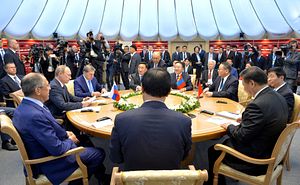Overshadowed by the news of the British referendum on European Union (EU) membership held the same day, on June 23 Presidents Xi Jinping of China, Vladimir Putin of Russia, and Tsakhiagiin Elbegdorj of Mongolia signed a trilateral economic partnership agreement in Tashkent, Uzbekistan during the 11th meeting of the Shanghai Cooperation Organization (SCO).
The agreement consists of 32 proposed projects, and outlines the creation of a joint investment center to assess the financial requirements and feasibility of each by the end of 2016.
According to the official press release on Elbegdorj’s website, a key part of the agreement involves cooperation on improving roads and other forms of transportation in the region. The agreement proposes regular consultations with third-party transport agencies, including railway companies.
The deal also affirmed that the future trilateral relationship between China, Russia, and Mongolia would not be limited to “transport and customs issues” but perhaps extend to agriculture, tourism, emergency preparedness, and more.
Mongolia plans to host the next round of talks on the implementation of the economic corridor in the fall, after the highly-anticipated Asia Europe Meeting (ASEM) in Ulaanbaatar this summer.
After a roadmap for the agreement was signed in November 2015 in Ufa, Russia, many expected an official agreement to be signed during this year’s SCO meeting.
As The Diplomat reported last fall, the economic corridor, aimed at greater trade integration, is in line with the individual policies in all three countries: China’s “One Belt, One Road” (OBOR), Russia’s Trans-Eurasian Belt Development (TEPR), and Mongolia’s Prairie Road program.
The leaders of the three countries first met in September 2014 to discuss the corridor in Dushanbe, Tajikistan. Putin said in the initial meeting with his Chinese and Mongolian counterparts: “The natural geographic proximity of Mongolia, Russia and China makes it possible for us to implement good long-term projects in infrastructure, the power sector, and the mining industry. We have what to discuss with each other. Naturally, we deem it important, expedient, and useful to start a permanent dialogue.”
Yesterday, in an exclusive interview with The Diplomat, Mongolian Minister of Foreign Affairs Lundeg Purevsuren said that “each of the 32 projects is the most important” when asked about Mongolia’s priorities entering the agreement. Purevsuren said that the trilateral cooperation represents a new era of economic opportunity for Mongolia, which will continue to capitalize on its strategic location as an intermediary between East Asia and Europe.
Last week, also at the SCO meeting in Tashkent, Putin asked Mongolia to back down from a planned $1 billion hydropower project on a tributary of Mongolia’s Selenge River, which flows into Russia’s Lake Baikal, the world’s oldest and deepest freshwater lake. The project, funded in part by a loan from the China Export Import Bank and in partnership with China’s National Development and Reform Commission, has been temporarily put on hold.
It is unclear if the hydroelectric project will be affected by the new trilateral partnership. Purevsuren reaffirmed Mongolia’s commitment to the Egiin Gol plant but also said his country is dedicated to acting in accordance with principles of environmental protection, which is a product of Mongolia’s nomadic culture.
Munkhsoyol Baatarjav, CEO at the Institute for National Strategy, told The Diplomat that the trilateral agreement “is a good start for Mongolia in terms of cooperation with two giant neighbors.” Baatarjav, who is currently running for parliament as an independent candidate, said the deal represents a valuable opportunity for Mongolia to expand its economy and solve infrastructure challenges.
Other analysts are skeptical about the future impacts of the agreement on Mongolia, which currently has the weakest economy of the three nations. Dr. Julian Dierkes, director of the Program on Inner Asia at the University of British Columbia’s Institute of Asian Research and author of the popular Mongolia Focus blog, described Mongolia’s dilemma: “Economic possibilities on the one hand, [and, on the other,] trepidation about a situation where two powerful, sometimes overbearing neighbors agree.”
Dr. Kent Calder, director of the Reischauer Center for East Asian Studies at Johns Hopkins University’s School of Advanced International Studies, called the agreement indicative of a “broad regional trend” toward deepening economic integration across the continent.
Calder argued that the region’s propensity toward increasing interdependence is “spurred by several developments including Chinese economic growth, deepening Sino-Russian diplomatic ties flowing from Euro-Russian tensions since the Ukraine crisis, the greater autonomy of Central Asia since the collapse of the Soviet Union, and technological developments in high-speed rail and communications.”
While the news was overshadowed internationally by the U.K.’s vote to leave the EU, it was covered widely by Asian news outlets including The Japan Times and CCTV.

































